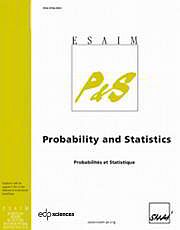No CrossRef data available.
Article contents
Les P-values comme votes d'experts
Published online by Cambridge University Press: 15 August 2002
Abstract
The p-values are often implicitly used as a measure of evidence for thehypotheses of the tests. This practice has been analyzed with different approaches. It is generallyaccepted for the one-sided hypothesis problem, but it is often criticized for the two-sided hypothesisproblem. We analyze this practice with a new approach to statistical inference. First we select gooddecision rules without using a loss function, we call them experts. Then we define a probabilitydistribution on the space of experts. The measure of evidence for a hypothesis is the inductiveprobability of experts that decide this hypothesis.
Keywords
Information
- Type
- Research Article
- Information
- Copyright
- © EDP Sciences, SMAI, 2000
References
J.R. Barra, Notions fondamentales de statistique mathématique. Dunod, Paris (1971).
J.O. Berger, Statistical decision theory and Bayesian analysis, second edition. Springer-Verlag, New York (1985).
Berger, J.O. et Sellke, T., Testing a point null hypothesis: The irreconcilability of p-values and evidence.
J. Amer. Statist. Assoc.
82 (1987) 112-122.
R.J. Buehler, Fiducial inference, An appreciation, edited by R.A. Fisher. Springer-Verlag, New York, Lecture Notes in Statistics (1980) 109-118.
Casella, G. et Berger, R.L., Reconciling Bayesian and frequentist evidence in the one-sided testing problem.
J. Amer. Statist. Assoc.
82 (1987) 106-111.
CrossRef
Dickey, J.M., Three multidimensional-integral identities with bayesian applications.
Ann. Math. Statist.
39 (1968) 1615-1628.
CrossRef
Fisher, R.A., The fiducial argument in statistical inference.
Annals of Eugenics
6 (1935) 391-398.
CrossRef
Gabriel, K.R., Simultaneous test procedures — some theory of multiple comparisons.
Ann. Math. Statist.
40 (1969) 224-250.
CrossRef
Hung, H.M.J., O'Neill, R.T., Bauer, P. et Köhne, K., The behavior of the p-value when the alternative hypothesis is true.
Biometrics
53 (1997) 11-22.
CrossRef
Hwang, J.T., Casella, G., Robert, C., Wells, M.T. et Farrell, R.H., Estimation of accuracy in testing.
Ann. Statist.
20 (1992) 490-509.
CrossRef
S. Karlin, Decision theory for Pólya type distributions. Case of two actions, I, in Proc. Third Berkeley Symposium on Math. Statist. and Prob. Univ. of Calif. Press 1 (1955) 115-128.
Kroese, A.H., van der Meulen, E.A., Poortema, K. et Schaafsma, W., Distributional inference.
Statistica Neerlandica
49 (1995) 63-82.
CrossRef
E.L. Lehmann, Testing statistical hypotheses, second edition. Wiley, New York (1986).
van der Meulen, E.A. et Schaafsma, W., Assessing weights of evidence for discussing classical statistical hypotheses.
Statistics & Decisions
11 (1993) 201-220.
A. Monfort, Cours de statistique mathématique. Économica, Paris (1982).
G. Morel, Expertises : procédures statistiques d'aide à la décision, Pré-publication. LAST-Université de Tours (1997) 182.
G. Morel, Probabiliser l'espace des décisions, Pub. Sém. 97 : Bru Huber Prum, Paris V (1998) 71-98.
C. Robert, L'analyse statistique bayésienne. Économica, Paris (1992).
D. Salomé, Statistical inference via fiducial methods, Ph.D. Thesis, Rijksuniversiteit Groningen (1998).
W. Schaafsma, J. Tolboom et B. van der Meulen, Discussing truth and falsity by computing a Q-value, in Statistical Data Analysis and Inference, edited by Y. Dodge. North-Holland, Amsterdam (1989) 85-100.
H. Scheffé, The analysis of variance, sixième édition. Wiley, New York (1970).
Schervish, M.J., P-values: What they are and what they are not.
Amer. Statist.
50 (1996) 203-206.
Thompson, P., Improving the admissibility screen: Evaluating test statistics on the basis of p-values rather than power.
Comm. Statist. Theory Methods
25 (1996) 537-553.
CrossRef
* Recherche réalisée dans le cadre du LAST et du CNRS UPRES-A 6083 de Tours..

